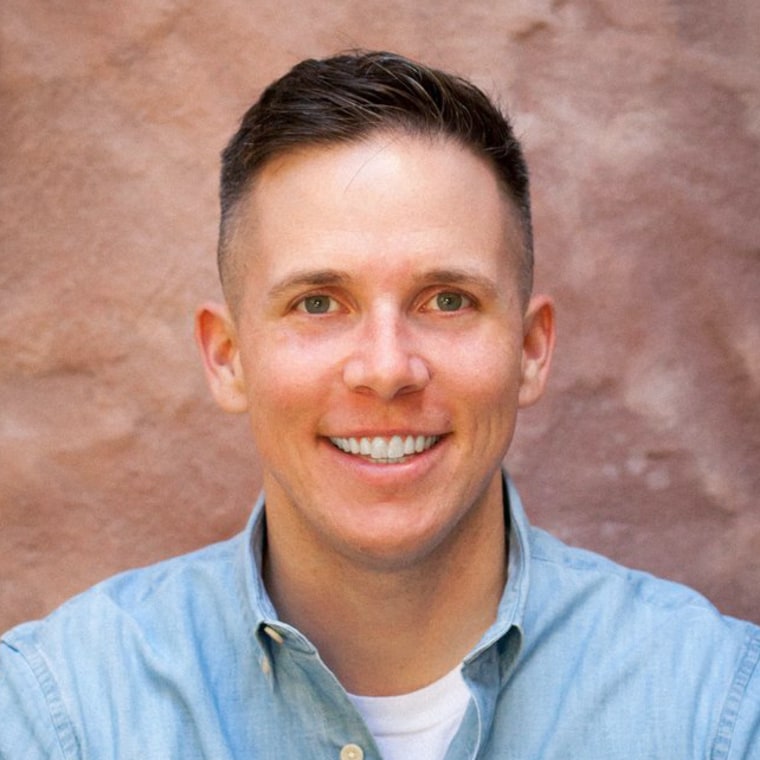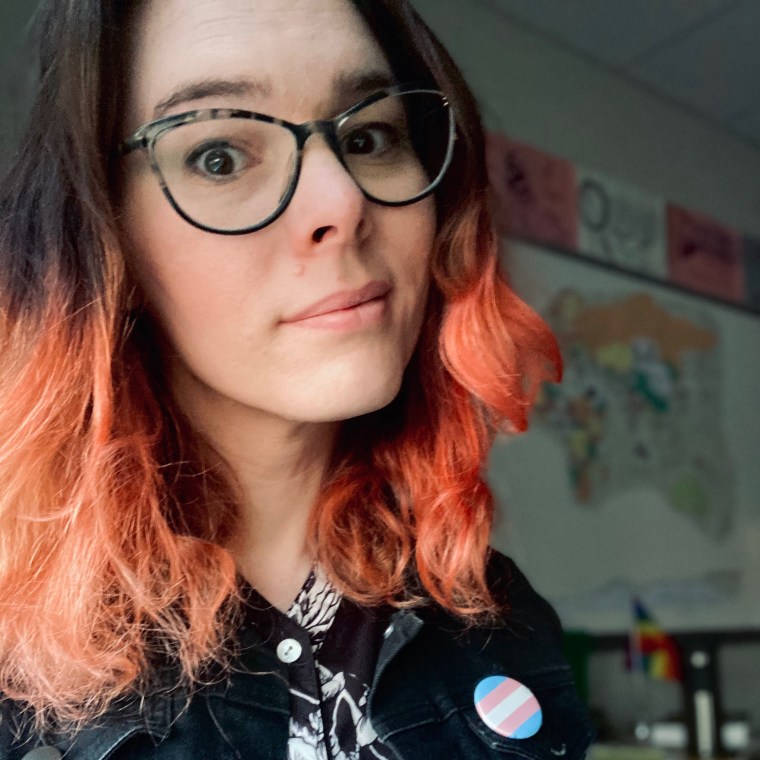Teachers fear transgender students are becoming ‘political pawns’ for GOP bills
Heather Hughes, a music and math teacher at a private school in Eureka Springs, Arkansas, said a 16-year-old student pulled out her phone Monday afternoon and announced that Gov. Asa Hutchinson had vetoed a bill that would have banned transgender minors from accessing gender-affirming medical care.
Hughes said it shows that young people understand the national conversation about trans youth, who are the focus of a wave of state bills that seek to restrict their access to transition-related medical care and sports.
“They get that something’s up, and they understand enough to be like, ‘This is a bad idea,’” Hughes said of her students. “They think it’s asinine. They don’t understand why it’s a big deal in the first place, like why bother making these bills, and so then anytime it’s brought up, they’re mostly infuriated.”
Another student, who is 15, talked to Hughes last week about how they wanted to start testosterone soon. But on Tuesday, the Arkansas Legislature overrode Hutchinson’s veto, and the state is now poised to become the first to ban gender-affirming care for trans minors.
The law bans insurance plans from covering or reimbursing the cost of transition-related care for minors, including puberty blockers and hormones. After it takes effect this summer, Hughes’ student won’t be able to use testosterone unless they pay out of pocket, which Hughes said is “not that likely given their situation.”

Hughes, who is also trans, called the Arkansas law “ridiculous” and said it “opens up the door to more restrictions.” She said her doctor informed her that part of the law will also explicitly allow private insurance companies in the state to refuse to cover gender-affirming care for trans people of any age.
“We’re already getting priced out of so many things and already face enough — why make it worse?”
Hughes is one of 17,300 educators in the U.S. and Canada who signed an open letter to President Joe Biden Monday calling on him to do more to directly address the wave of state bills targeting transgender young people. There are currently 20 states that have introduced bills that would prohibit or restrict transition care for trans minors, according to the ACLU, and more than 30 that have introduced measures that would ban trans student athletes from competing on school sports teams that align with their gender identity. According to the Movement Advancement Project, five states — Arkansas, Idaho, Mississippi, Tennessee and South Dakota — have passed such legislation, though a federal judge stopped Idaho’s law from taking effect last August.

How Arkansas ban on transition-related care will affect minors
Harper Keenan, an assistant professor in the department of curriculum and pedagogy at the University of British Columbia, helped organize the letter.
Keenan taught elementary students in New York City public schools for five years, and said the bills create a dangerous power dynamic. Legislation that bans transgender student athletes from competing on the sports teams that align with their gender identity, for example, positions transgender girls “as predators invading girls’ spaces,” he said.

“This is a violation of some of our most fundamental responsibilities as educators, which is to support and protect the young people that we work with,” Keenan said. “When we position young people as predators, especially a particular group of young people as predators, we really put them in danger.”
The letter from educators calls on the Biden administration to protect transgender young people’s access to health care, school facilities and activities, and school records and identification that reflects their self-identified gender.
“Anti-trans bills are merely the tip of a much larger iceberg of anti-trans sentiment, gender misunderstandings, and the scapegoating of trans youth that serves to mobilize a conservative base,” the letter states.
The Biden administration did not respond to NBC News’ request for comment on the letter, but an official did confirm that Biden issued an executive order this month stating that Title IX of the Education Amendments of 1972, which protects students at schools receiving public funds from sex-based discrimination, also protects them from discrimination based on gender identity or sexual orientation. The Department of Justice supported Biden’s order in a memo released Monday, which said it interprets Title IX to protect LGBTQ students.
The official also said the Department of Education’s Office of Civil Rights announced on Tuesday that it will conduct a comprehensive review of Title IX regulations to fulfill Biden’s recent executive order.
Lawmakers who support restrictions on trans student athletes have said these measures are necessary to protect cisgender girls’ opportunities in sports. However, legislators in almost all the states considering bans could not cite any known cases where trans girls’ participation in sports caused a problem in their state or region, according to an Associated Press report published last month.
Still, Hutchinson said the state’s ban on trans athletes in sports, which he signed March 25, “will help promote and maintain fairness in women’s sporting events.”
Supporters of the gender-affirming care restrictions argue that they’re protecting minors who are too young to make medical decisions. The sponsor of Arkansas’ recently passed trans health bill, state Rep. Robin Lundstrum, a Republican, compared it to laws that prevent minors from purchasing alcohol until they’re 21.
“They need to get to be 18 before they make those decisions,” Lundstum said, according to The Associated Press.

Some teachers believe the debate over trans minors’ access to care is really a debate over their existence. Elizabeth-Marie Helms, a trans middle school social studies teacher in Fort Wayne, Indiana, said legislators “don’t really have any interest in science-based medicine.” She noted that lawmakers in Indiana, like those in Arkansas, want to ban trans minors’ access to puberty blockers, even though they have long been used to treat precocious puberty in cisgender youth and wouldn’t be banned for cisgender young people.
“I try to teach my students, ‘Listen to others with empathy. Even if you don’t agree with them, try to understand their points of view,’” Helms said. “In these cases at the state level, it’s just really unclear what a sincere approach to these Republican talking points would even look like, because it just nakedly looks like they’re trying to erase trans people.”
Some cisgender educators like Melissa Tracy, who teaches at a high school in Delaware, said they’re worried about the effects of the bills on trans students at school.
“It’s personal for me, because I think of every trans student who has ever sat in my classroom, and, frankly, they deserve better,” she said. “They are not political pawns.”
Tracy said she participated in a workshop 10 years ago that changed her understanding of the needs of LGBTQ youth. The presenter said that 30 to 40 percent of LGBTQ students will experience suicidal ideation. (That number is higher for trans youth: Fifty-two percent reported that they seriously considered suicide from December 2019 to March 2020, according to the Trevor Project’s 2020 National Survey on LGBTQ Youth Mental Health.)
“Since then, I’ve tried to really do right by the students that I teach,” Tracy said.
Several states, including Alabama and Iowa, are considering bills that would force state employees, including teachers, to out students to their parents if they believe a student is questioning their gender. Being forced to “out” a student takes away their agency and jeopardizes one of the few places that some trans youth feel safer, according to Tracy.
“Why wouldn’t we want to do whatever we can to create safe spaces for our students, because, frankly, some of the students that I have taught have not been accepted at home, and literally the only place where they might feel accepted is at school,” she said. “And then you remove that space of acceptance, and they can’t be who they want to be, and that’s just not right.”
Some teachers and advocates say they’re already seeing the national conversation affect trans students.
Julia Cuneo, a youth organizer and educator who helps high school students in Detroit with advocacy campaigns, said a few students have reached out to “express fear and concern” after Republican lawmakers in Michigan introduced a trans athlete ban.
“We have some students who are trans and genderqueer and who are really worried about the ways that their school will target them, and the ways that they won’t be able to express themselves in their classes,” Cuneo, who uses gender neutral pronouns, said. Some students fear their identity could be both disrespected and used against them or that they could be outed.
“They don’t know exactly how this will manifest,” Cuneo said. “The legislators write the law but then it’s kind of up to schools how it gets enforced, and so that uncertainty is really really scary.”
Cuneo said the bills put students and teachers against each other. They said they don’t know of any teachers who openly support Michigan’s athlete ban, but “I’ve definitely talked to teachers who feel like, ‘Well, the law is the law, and I have to do it or I’ll get in trouble.’”
Currently, both teachers and students want to create a safe environment for learning, but if the bills become law, their interests would clash, according to Cuneo.
“I think that’s really the end goal of the GOP in this moment, is to try and put that wedge between supporters and allies, people who are in solidarity with queer people, and the young people who are coming out,” they said.
Tracy said she wonders whether the sponsors of the bills know any trans youth or have spoken with any.
“I guarantee you that if they took even just 10 minutes out of their busy schedule to talk to somebody that perhaps their viewpoint might change,” she said. “Ultimately, I think this is just what I want to tell those legislators: It’s not about you. It’s not about you. It’s about the kids of America. It’s about the kids in your state.”





